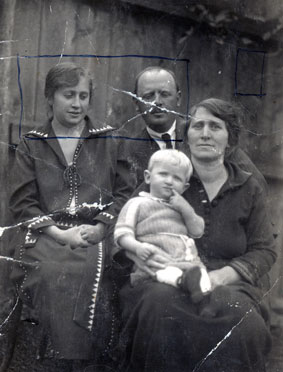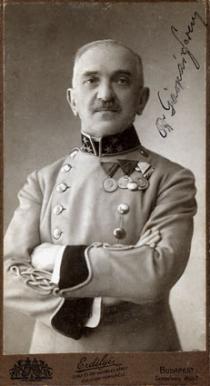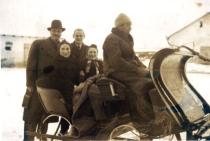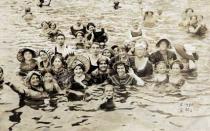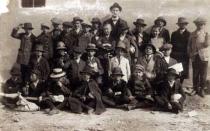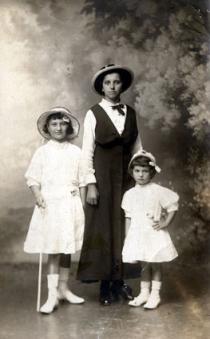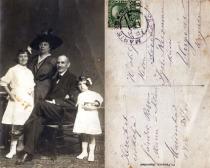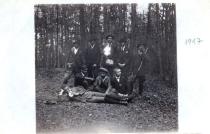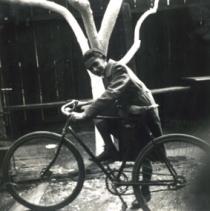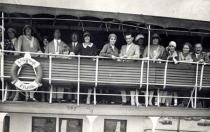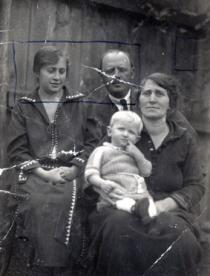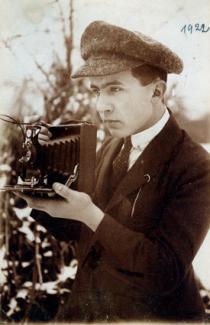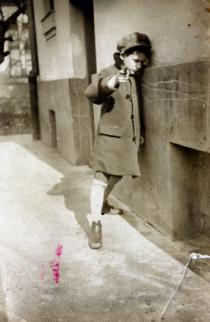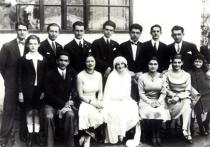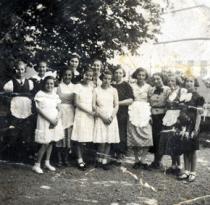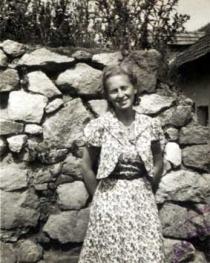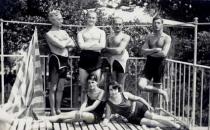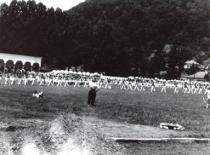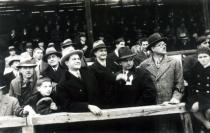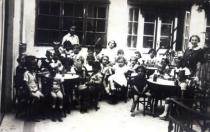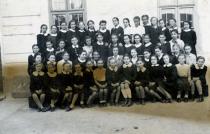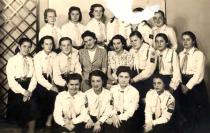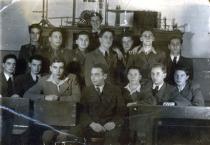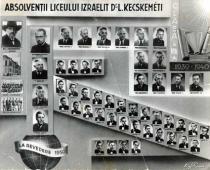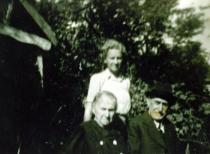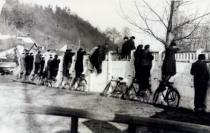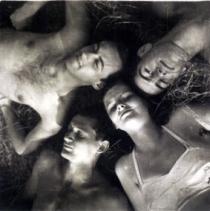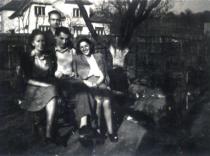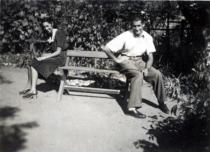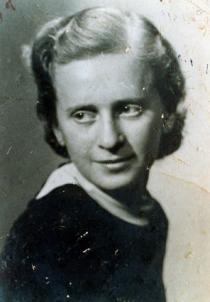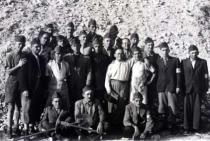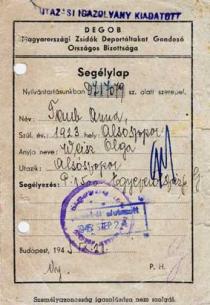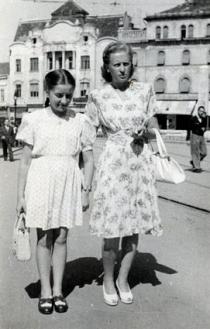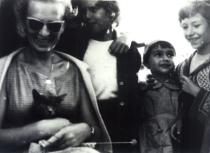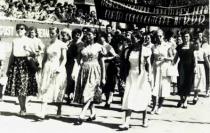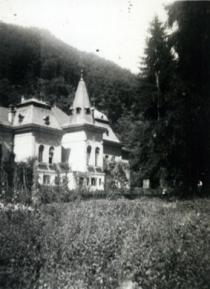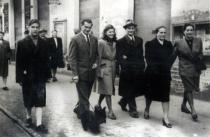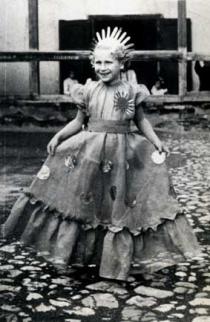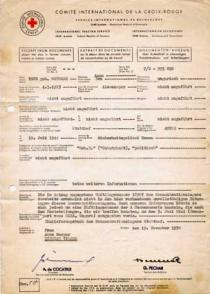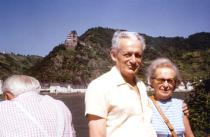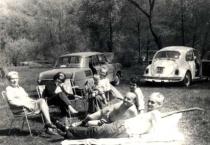These are my father Hugo Schwartz, my mother Olga Schwartz, my elder brother Laszlo Schwartz and our nanny. My husbands have a frame drawn around them because we had these sections enlarged. My mother was 21, my father 32, my brother was born in 1921, so he wasn't one year old yet. This is my only photo about my brother. I had only one sibling, my elder brother Janos Laszlo Schwartz. He was born in Nagyvarad. I was born in Alsoszopor, in 1923, where my parents lived at that time, but I grew up in Varad. We were on very good terms with my brother, although I wasn't such a good to him as he was to me.
Our nanny's name was Teri, and she took care of us until I turned three, until my parents divorced. Practically she raised us, because my mother was still very young then. She was Hungarian, and I think her husband was Romanian, because his name was Hot. She was so hard working that if when my mother went into the kitchen, she went into the room and told her 'If the lady comes to the kitchen, I'll go to the room and sit down in the armchair.' She never let my mother even to go to the kitchen, she was doing everything. And we called her mama. When I came back to Alsoszopor in 1944-1945, she was still alive. She often came over to help me, while her husband was working in the vegetable garden.
Everybody says his/her mother is the best, but I say she was better than the best. So I loved her with all of my heart. I lost her so many years ago, and I mourn for her even now…She was everything for me.
My mother's name was Olga Weiss, she was born around 1890. She was the only girl of her parents. She attended the Catholic school and high school from Nagyvarad, but I don't know why. There are things I remember and I realize I reconciled with everything. I agreed with everything they did. Why mom was raised by nuns? Her parents were in Zerind, she was in Varad, and she attended the convent there. I don't know why. I am sure this she was so warm-hearted because nuns raised her. She graduated the high school, although the girls weren't really used to graduate then. She knew only one Romanian sentence: 'Merge la padure' [Go to the forest]. She didn't speak Hebrew neither, but she knew German. In our family everybody knew German [we learnt from the governess].
My father's name was Hugo Schwartz, he was born in 1888 in Debrecen. I know he was an officer in the Austro-Hungarian army. He was very proud he was lieutenant. He had a decoration and he was so proud he was showing off with it all the time. He related us much about the war, because he fought through World War I. When he was demobilized after the war, he became a farmer. He graduated a university as agricultural engineer. My father wasn't religious at all, he didn't wear a hat, he wasn't even kosher. And he didn't observe the traditions. Jews are allowed to eat only kosher meals, pork meat and pork fat is forbidden. That's why they must use hen or goose fat for cooking. The shochet has to slaughter the chickens, cows and calves. But my father didn't observe these rules. We had everything: bacon, sour cream and meat.
I found out how my parents met only after the deportation. My husband and me were from Varad and we had a good acquaintance, Dr. Deutsch, Elemer Deutsch, and he invited us for a Seder eve. He wasn't religious, but he observed the traditions. His cousin, Dengelegi, was there, too. The wife of his cousin, Edit Palfi, a lady doctor, was invited also. They lived in Vasarhely. Another guest was the cousin of Deutsch's wife. They invited both us and them. I knew better his wife, Marta, she was my French teacher in the Jewish high school, and they asked me about my father, because they knew only my mother. And I began to relate. And then the doctor said - he was a big, fat man: 'I remember now, I was the sadhen…! I put in touch your mother with your father, but then I heard that the marriage went wrong.' I don't know where he knew my father from, but it doesn't matter. But he blamed himself for that. Around then the parents made kind of a fair, and traded what they would bring in. What could one feel for a stranger? Nothing. There wasn't any courting. My mother became a fiancee, and then they made arrangements for the wedding. It was a great wedding, I think. They married around 1917-18.
My parent's marriage wasn't a subject of conversation, it took place probably in Zerind, but I don't know exactly. They had both a civil and a religious marriage, and it was particularly difficult for them to divorce. Jews usually didn't separate the couples like the Catholics. [Editor's note: The comparison is incorrect because the Catholic Church forbids the divorce. Anna Gaspar referred to the fact that the Halacha strictly regulates the divorce procedure. The Halacha doen't recognize the civil divorce, the divorce procedure must be conducted under the supervision of the bet din (the Rabbinical Court).] It took quite a long time, but my grandparents insisted on the divorce. After they divorced, my mother assumed again her maiden name, and was registered as Olga Weiss. After they divorced, my mother remained single and so did my father. My mom's photo was all the time on my father's desk. He claimed my grandmother was the one who separated them. To be honest, my grandmother was a damn bad woman. It's not nice to say this, but she was a very bad woman. And I believe she separated my parents. But I never found out why.
My father lived in Hungary, in Tornyosnemeti, near the Bohemian-Hungarian border. He was a communicative person - everybody liked him in the village. He used to help us, so he asked all the time what we needrd, but I had to answer: 'Thank you, we have all we need.' A child always needs something, but I had to answer that. But he always brought something.
